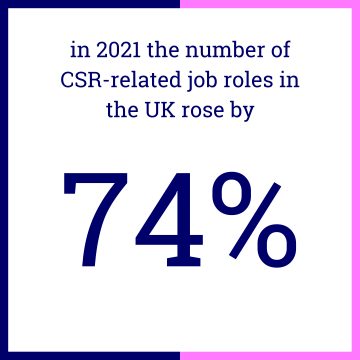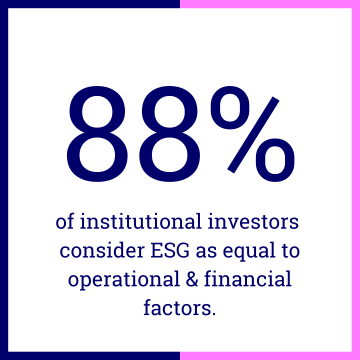CSR (Corporate Social Responsibility) – and it’s alternative acronym ESG (Environmental, Social, Governance) – has officially taken centre stage. The UK saw a 74% increase in CSR-related roles in 2021. And we know that those roles are intended for more than virtue signalling. How do we know that? Because 28% of them are at the leadership level. In other words, CSR is here to make an impact.** We explore 6 of the biggest challenges facing CSR and ESG leaders in the current landscape.
Here are the factors driving the rise in CSR:
- Millennials and Gen Z hold more buying power, as consumers and business leaders
- Customer and employee values are changing – people want more from the companies that they buy from and work for
- Governments are making bold commitments to eliminate carbon emissions and end world hunger and businesses need to get in line
- Companies are quickly realising they have to respond by improving how they support people, communities, and the environment
6 Major Challenges for CSR and ESG Leaders
So, all eyes are on CSR and the impact that today’s new crop of CSR and ESG leaders can achieve. That’s a lot of pressure on a group of business leaders whose jobs are already demanding.
Companies are asking CSR and ESG leaders to think even bigger than community engagement programs and energy efficiency plans. They’re required to rapidly master a widening set of skills including strategy, communications, change management, and reporting.
At ActionFunder we speak with CSR professionals interested in making the most of the support we offer; through our business-to-community platform and our community-engagement consultancy. Here are a few of the core challenges we see these CSR and ESG leaders facing as they try to help their companies chart a new course.
1. CSR and ESG initiatives are under the microscope
As more businesses are implementing CSR programs, hundreds of brands are being called out for greenwashing, purpose-washing, and labour rights abuses.
The UK Competition and Markets Authority (CMA) found that 40% of global companies had misleading environmental claims on their websites. In response, it introduced the Green Claims Code. These new principles mandate that a company’s environmental-related claims must:
- Be honest and accurate
- Be clear and unambiguous
- Not avoid sharing important information
- Only make fair and meaningful comparisons
- Consider the full product or service lifecycle
- Only make substantiated claims
Some believe this is the first of many policies that are going to hold companies to account for not just their impact, but also the initiatives they setup to clean up their act.
2. Meeting the demand for transparency
It’s no longer enough for a company to make claims or have good intentions. Businesses are expected to prove the good they’re doing.
People want to know that companies have:
- Strategies to reduce their environmental footprint
- Supply chains free from modern slavery
- Diverse and equitable company cultures
- Programs to support local communities
- Operations free from unethical practices
This demand for transparency has given rise to reporting systems based on Environmental, Social, and Corporate Governance (ESG). ESG is an important player in the quickly-growing CSR conversation. Using ESG reporting methods, companies are evaluating and reporting on their work across the sustainability remit.
3. Pressure from all sides
CSR and ESG leaders face rising expectations from all stakeholders—consumers, employees, and investors alike. The 2022 Edelman Trust Barometer makes it clear that everyone expects businesses to do more to address major issues in the world and their communities.
- Investors are pushing organisations to step up their game. 88% of institutional investors now consider ESG criteria as equal to operational and financial factors.
- Customers are supporting businesses that do better. 58% of consumers buy or advocate for brands based on their beliefs and values.
- Employees want employers to add value to their lives and communities beyond just a paycheck. 60% of people say they choose a place to work based on their beliefs and values.
4. Managing all communications
All of the stakeholders listed above expect clear and relevant communication around what types of CSR activity are taking place and why. CSR leaders must work across internal and externals groups, forging connections and regularly sharing information with:
- Executive leaders
- HR directors
- Marketing and PR teams
- Procurement and production teams
- Local community leaders
- Customer communities
Each group has its own interest areas, meeting cadences, feedback loops, and expectations. The sheer volume of comms required to keep these relationships flowing can be overwhelming.
5. Alignment and adoption
Despite employees having such high expectations for employers to do better, it’s often difficult to get the whole company on board with CSR initiatives. After all, corporate social responsibility means change. And change is hard.
But gaining traction takes a company-wide effort—from the buy in of executive leaders to the actions of frontline workers. CSR leaders can help drive alignment and adoption by practicing a change management mindset.
6. Driving profit with CSR initiatives
CSR initiatives are often totally focused on creating (or, in the case of sustainability initiatives, minimising) impact. But at the end of the day, no matter how much we talk about the triple bottom line, the vast majority of businesses remain motivated by the single aim of maximising financial profits.
So, it’s critical that CSR leaders learn to advocate for and optimise their programs with profitability front and centre. While this may not be second nature to many of the people in CSR roles, they can make meaningful progress by:
- Streamlining the ability to identify and execute CSR opportunities
- Tying resources to specific initiatives
- Monitoring and reporting real outcomes (in terms of financial, environmental and societal impacts)
- Sharing triple-bottom-line impact with internal and external stakeholders
How CSR Leaders Can Overcome These Challenges
Sometimes the challenges seem insurmountable. But with the right tools and support, any CSR lead can overcome the pressures and exceed expectations.
Here are some proven tactics to help CSR leaders rise to the occasion:.
- Walk the talk: You don’t have to be perfect on your quest to be a better company, as long as you have a clear purpose and take the actions to back it up. In fact, consumers are 6 times more likely to protect a company in the event of a misstep if they think the company has a strong purpose. Back that up with real action and you’re on the road to success.
- Make everyone part of the solution: One of the best ways to get company-wide support for your CSR initiatives is to involve team members from the beginning. Consider assembling a working group to collaborate on plans for reaching your CSR goals. And then keep stakeholders informed as their ideas become realities.
- Share as much as possible: Keep people informed of your progress and wins, both big and small. Whether through your monthly newsletter, company calls, or annual impact report—be sure to share regular highlights through multiple channels. And share the lowlights too. Because no plan goes exactly according to plan and when you are open about that – both internally and externally – you gain trust, and support fellow CSR leaders to increase the positive impact of their businesses.
- Leverage technology: There’s a whole category of Corporate Social Responsibility Software to help organisations manage and measure CSR impact. There are also platforms like ActionFunder (our personal favourite!) that streamline company-to-community funding, supporting CSR leaders to walk the talk and report on the impact. Consider allocating a small portion of your CSR budget to technology designed to streamline your efforts and improve your results.
How ActionFunder Makes CSR Easier and More Profitable
ActionFunder makes it quick and easy to find, fund, and follow the impact of local non-profits aligned with your company’s purpose, aims and ambitions.
By automating matchmaking, due diligence, financial transfers, and impact reporting, the platform cuts the cost of local giving by 75%.
“Using ActionFunder is transforming charitable giving for Sir Robert McAlpine and helping us to deliver on our social value ambitions. The platform is easy to use and scalable so that we can target giving in various regions and towards specific causes. [It] has helped us plan our charitable giving budget more efficiently and boosted how we measure the impact of giving.” ~ Lynda Thwaite, Group Director Marketing and Communications, Sir Robert McAlpine
See how ActionFunder can make your job as a CSR leader a whole lot easier.


** According to Robert Walters’ recent Environment, Social, and Governance Report